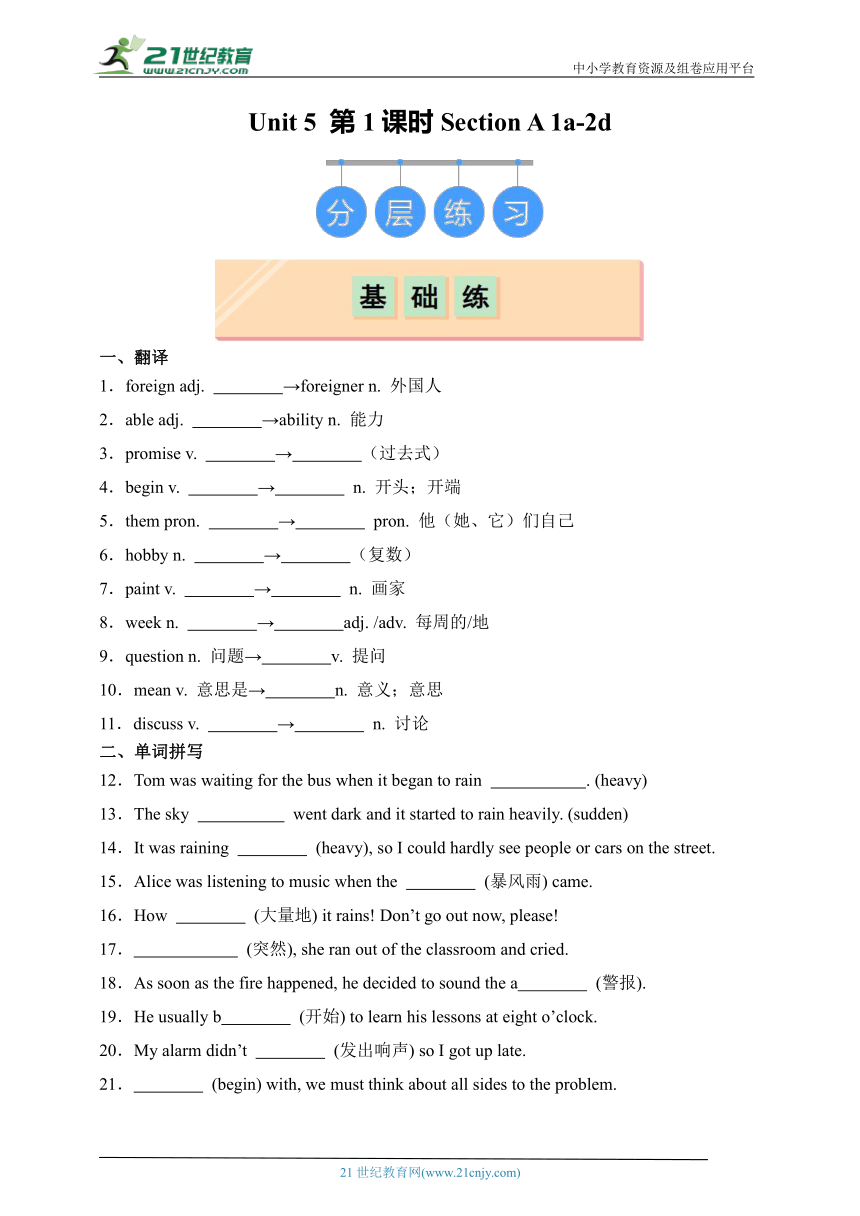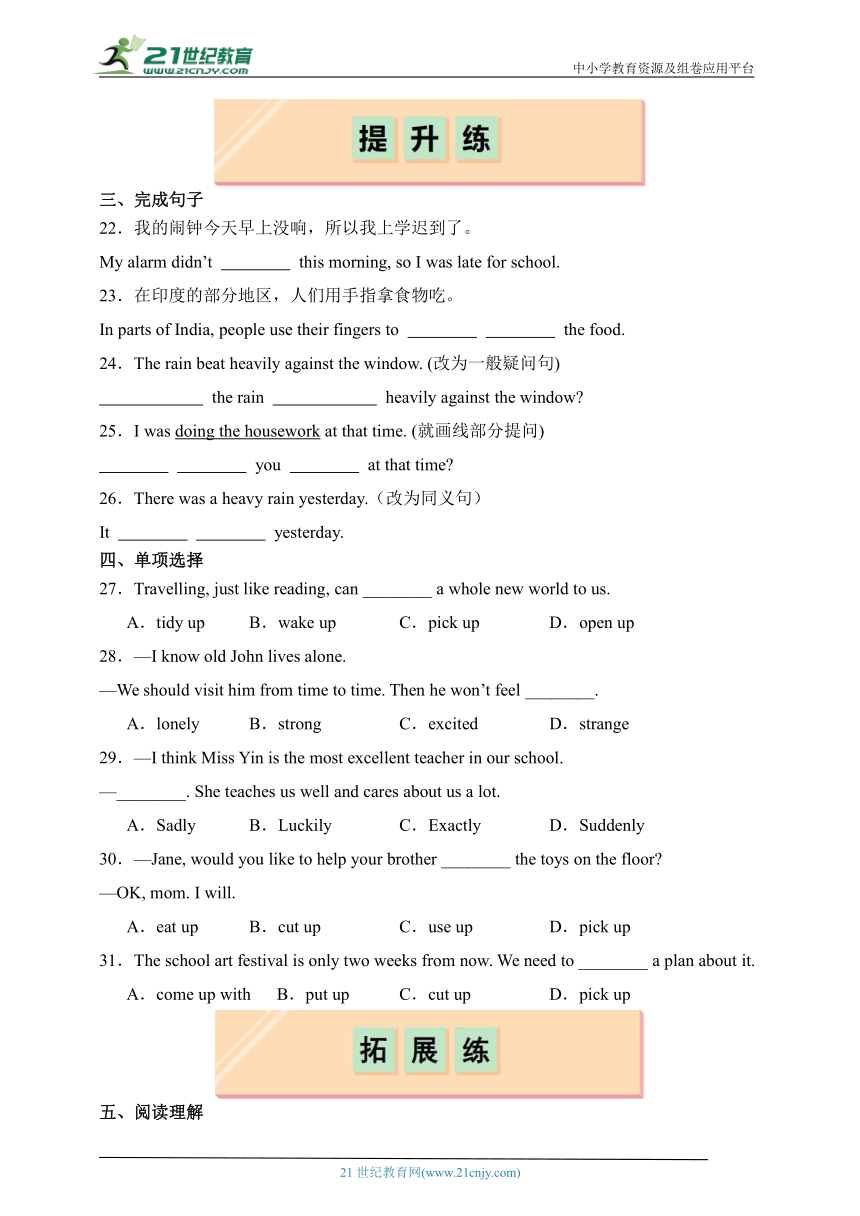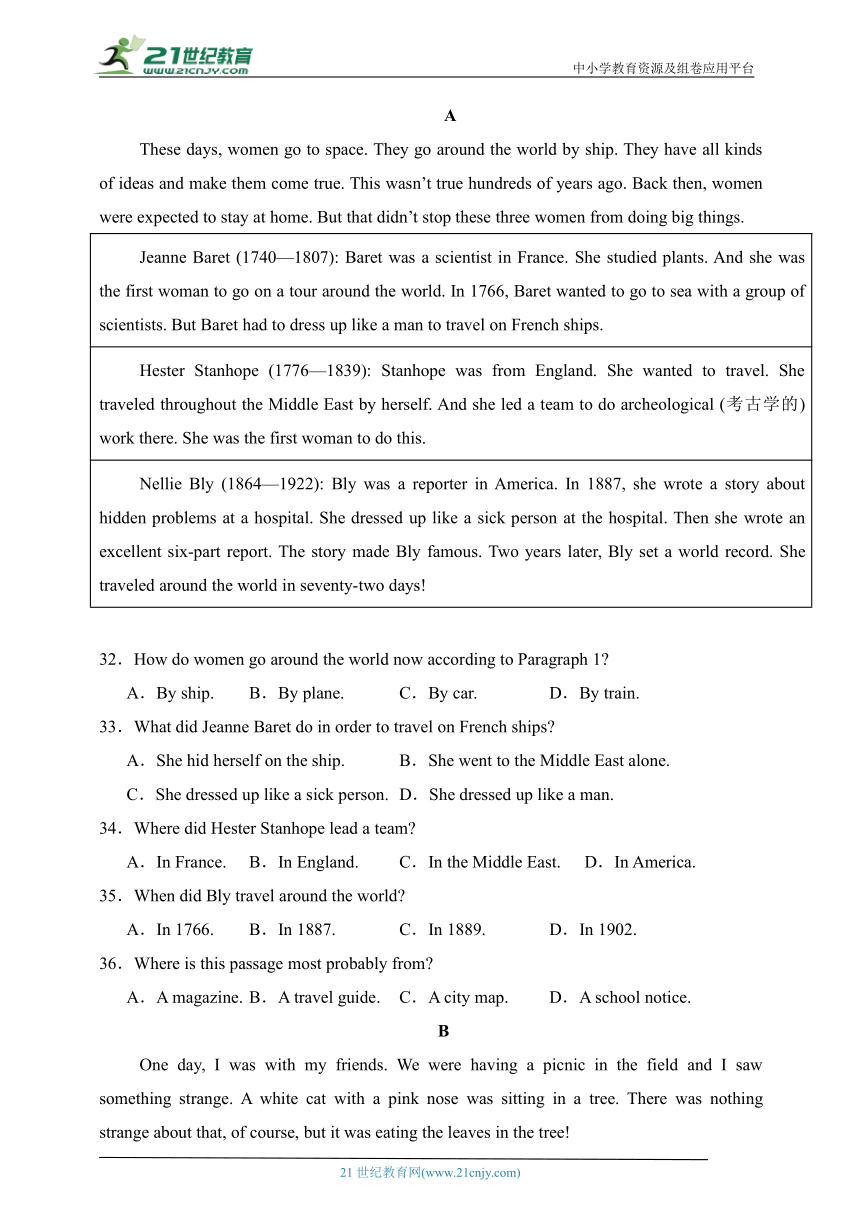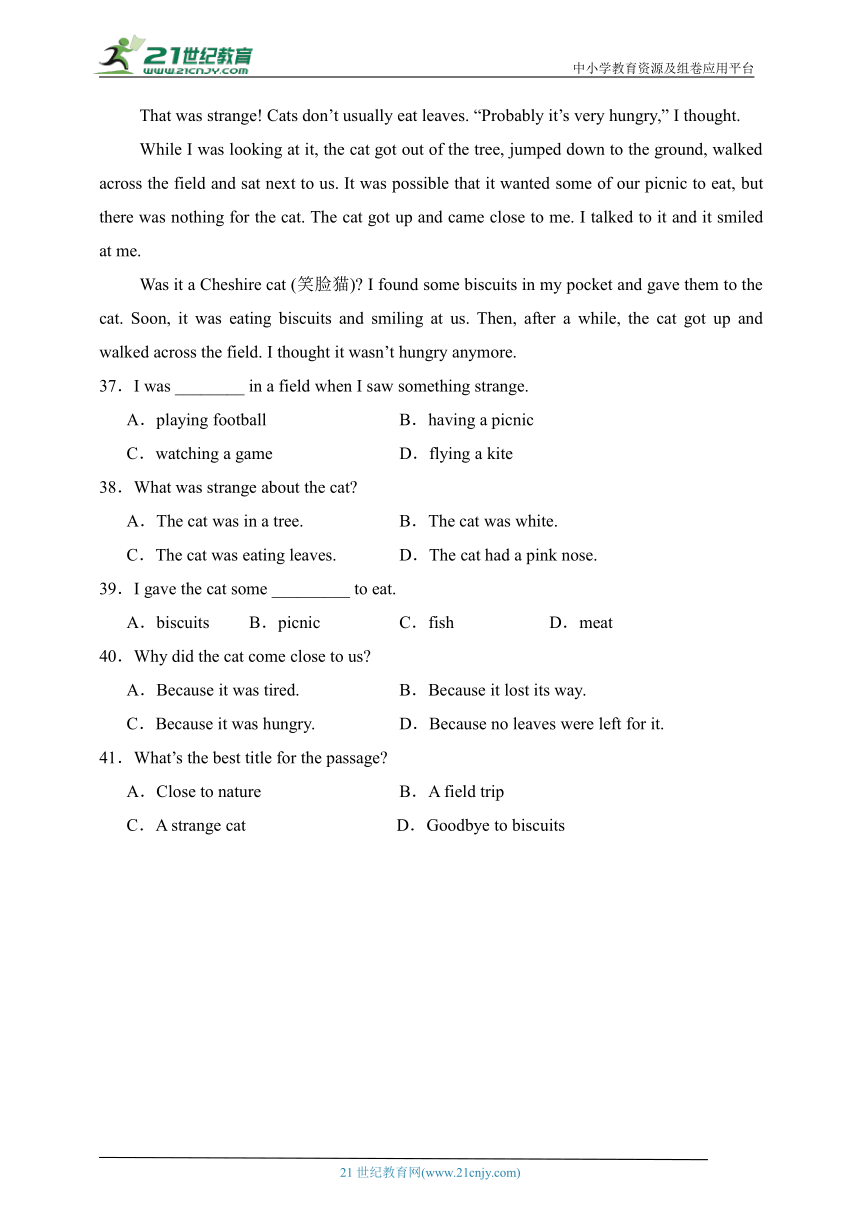Unit 5 第1课时Section A 1a-2d(分层作业)-2024-2025学年人教版英语八年级下册
文档属性
| 名称 | Unit 5 第1课时Section A 1a-2d(分层作业)-2024-2025学年人教版英语八年级下册 |

|
|
| 格式 | doc | ||
| 文件大小 | 311.1KB | ||
| 资源类型 | 试卷 | ||
| 版本资源 | 人教新目标(Go for it)版 | ||
| 科目 | 英语 | ||
| 更新时间 | 2025-03-03 18:02:45 | ||
图片预览




文档简介
中小学教育资源及组卷应用平台
Unit 5 第1课时Section A 1a-2d
一、翻译
1.foreign adj. →foreigner n. 外国人
2.able adj. →ability n. 能力
3.promise v. → (过去式)
4.begin v. → n. 开头;开端
5.them pron. → pron. 他(她、它)们自己
6.hobby n. → (复数)
7.paint v. → n. 画家
8.week n. → adj. /adv. 每周的/地
9.question n. 问题→ v. 提问
10.mean v. 意思是→ n. 意义;意思
11.discuss v. → n. 讨论
二、单词拼写
12.Tom was waiting for the bus when it began to rain . (heavy)
13.The sky went dark and it started to rain heavily. (sudden)
14.It was raining (heavy), so I could hardly see people or cars on the street.
15.Alice was listening to music when the (暴风雨) came.
16.How (大量地) it rains! Don’t go out now, please!
17. (突然), she ran out of the classroom and cried.
18.As soon as the fire happened, he decided to sound the a (警报).
19.He usually b (开始) to learn his lessons at eight o’clock.
20.My alarm didn’t (发出响声) so I got up late.
21. (begin) with, we must think about all sides to the problem.
三、完成句子
22.我的闹钟今天早上没响,所以我上学迟到了。
My alarm didn’t this morning, so I was late for school.
23.在印度的部分地区,人们用手指拿食物吃。
In parts of India, people use their fingers to the food.
24.The rain beat heavily against the window. (改为一般疑问句)
the rain heavily against the window
25.I was doing the housework at that time. (就画线部分提问)
you at that time
26.There was a heavy rain yesterday.(改为同义句)
It yesterday.
四、单项选择
27.Travelling, just like reading, can ________ a whole new world to us.
A.tidy up B.wake up C.pick up D.open up
28.—I know old John lives alone.
—We should visit him from time to time. Then he won’t feel ________.
A.lonely B.strong C.excited D.strange
29.—I think Miss Yin is the most excellent teacher in our school.
—________. She teaches us well and cares about us a lot.
A.Sadly B.Luckily C.Exactly D.Suddenly
30.—Jane, would you like to help your brother ________ the toys on the floor
—OK, mom. I will.
A.eat up B.cut up C.use up D.pick up
31.The school art festival is only two weeks from now. We need to ________ a plan about it.
A.come up with B.put up C.cut up D.pick up
五、阅读理解
A
These days, women go to space. They go around the world by ship. They have all kinds of ideas and make them come true. This wasn’t true hundreds of years ago. Back then, women were expected to stay at home. But that didn’t stop these three women from doing big things.
Jeanne Baret (1740—1807): Baret was a scientist in France. She studied plants. And she was the first woman to go on a tour around the world. In 1766, Baret wanted to go to sea with a group of scientists. But Baret had to dress up like a man to travel on French ships.
Hester Stanhope (1776—1839): Stanhope was from England. She wanted to travel. She traveled throughout the Middle East by herself. And she led a team to do archeological (考古学的) work there. She was the first woman to do this.
Nellie Bly (1864—1922): Bly was a reporter in America. In 1887, she wrote a story about hidden problems at a hospital. She dressed up like a sick person at the hospital. Then she wrote an excellent six-part report. The story made Bly famous. Two years later, Bly set a world record. She traveled around the world in seventy-two days!
32.How do women go around the world now according to Paragraph 1
A.By ship. B.By plane. C.By car. D.By train.
33.What did Jeanne Baret do in order to travel on French ships
A.She hid herself on the ship. B.She went to the Middle East alone.
C.She dressed up like a sick person. D.She dressed up like a man.
34.Where did Hester Stanhope lead a team
A.In France. B.In England. C.In the Middle East. D.In America.
35.When did Bly travel around the world
A.In 1766. B.In 1887. C.In 1889. D.In 1902.
36.Where is this passage most probably from
A.A magazine. B.A travel guide. C.A city map. D.A school notice.
B
One day, I was with my friends. We were having a picnic in the field and I saw something strange. A white cat with a pink nose was sitting in a tree. There was nothing strange about that, of course, but it was eating the leaves in the tree!
That was strange! Cats don’t usually eat leaves. “Probably it’s very hungry,” I thought.
While I was looking at it, the cat got out of the tree, jumped down to the ground, walked across the field and sat next to us. It was possible that it wanted some of our picnic to eat, but there was nothing for the cat. The cat got up and came close to me. I talked to it and it smiled at me.
Was it a Cheshire cat (笑脸猫) I found some biscuits in my pocket and gave them to the cat. Soon, it was eating biscuits and smiling at us. Then, after a while, the cat got up and walked across the field. I thought it wasn’t hungry anymore.
37.I was ________ in a field when I saw something strange.
A.playing football B.having a picnic
C.watching a game D.flying a kite
38.What was strange about the cat
A.The cat was in a tree. B.The cat was white.
C.The cat was eating leaves. D.The cat had a pink nose.
39.I gave the cat some _________ to eat.
A.biscuits B.picnic C.fish D.meat
40.Why did the cat come close to us
A.Because it was tired. B.Because it lost its way.
C.Because it was hungry. D.Because no leaves were left for it.
41.What’s the best title for the passage
A.Close to nature B.A field trip
C.A strange cat D.Goodbye to biscuits
参考答案
题号 27 28 29 30 31 32 33 34 35 36
答案 D A C D A A D C C A
题号 37 38 39 40 41
答案 B C A C C
1.外国的 2.能够 3. 承诺 promised 4. 开始 beginning 5. 他(她、它)们 themselves 6. 业余爱好 hobbies 7. 用颜料画 painter 8. 周;星期 weekly 9.question 10.meaning 11. 讨论 discussion
【解析】1.foreign“外国的”,形容词。故填:外国的。
2.able“能够”,形容词。故填:能够。
3.promise“承诺”,动词,其过去式为promised。故填:承诺;promised。
4.begin“开始”,动词;beginning“开头;开端”,名词。故填:开始;beginning。
5.them“他(她、它)们”,人称代词;themselves“他(她、它)们自己”,反身代词。故填:他(她、它)们;themselves。
6.hobby“业余爱好”,名词,其复数为hobbies。故填:业余爱好;hobbies。
7.paint“用颜料画”,动词;painter“画家”,名词。故填:用颜料画;painter。
8.week“周;星期”,名词;weekly“每周的/地”,形容词或副词。故填:周;星期;weekly。
9.question“提问”,动词。故填question。
10.meaning“意义;意思”,名词。故填meaning。
11.discuss“讨论”,动词;discussion“讨论”,名词。故填:讨论;discussion。
12.heavily
【详解】句意:汤姆正在等公共汽车,这时开始下大雨。修饰动词rain,需要用副词heavily。故填heavily。
13.suddenly
【详解】句意:天变黑了,开始下起大雨。根据句子结构,空格处需要一个副词来修饰动词短语“started to rain heavily”,表示“突然地”。sudden是形容词,其副词形式为suddenly。故填suddenly。
14.heavily
【详解】句意:雨下得很大,所以我几乎看不到街上的人和车。heavy“沉重的,大量的”,是形容词,修饰动词raining,用副词,故填heavily。
15.rainstorm
【详解】句意:暴风雨来临时,爱丽丝正在听音乐。rainstorm“暴风雨”,名词,此处应用单数形式。故填rainstorm。
16.heavily
【详解】句意:雨下得好大啊!现在请不要出去。结合句意和汉语提示可知,heavily“大量地,在很大程度上”,副词,在句中修饰动词rains,作状语。故填heavily。
17.Suddenly
【详解】句意:突然,她跑出教室哭了起来。suddenly“突然地”,副词修饰句子。故填Suddenly。
18.(a)larm
【详解】句意:火灾一发生,他就决定拉响警报。alarm“警报”,名词。故填(a)larm。
19.(b)egins
【详解】句意:他通常在八点钟开始学习他的课程。根据首字母和中文提示,设空处为begin“开始”,根据“usuallly”可知,句子为一般现在时,主语He,动词要用第三人称单数。begin用第三人称单数形式begins。故填(b)egins。
20.ring/go off
【详解】句意:我的闹钟没有响,所以我起床晚了。根据提示“发出响声”可知可用动词ring或动词短语go off表示,助动词didn’t后跟动词原形。故填ring/go off。
21.To begin
【详解】句意:首先,我们必须考虑问题的各个方面。to begin with“首先,开始的时候”,固定搭配,动词不定式作插入语。位于句首要大写首字母。故填To begin。
22.go off
【详解】结合中英文提示可知,此处缺“(闹铃)响”,其对应的英文表达为“go off”,且否定助动词didn’t后应用动词原形。故填go off。
23. pick up
【详解】pick up“拿”,动词短语;不定式结构中用动词原形,故填pick;up。
24. Did beat
【详解】句意:雨重重地打在窗户上。原句是一般过去时,变一般疑问句需要借助助动词did,后跟动词原形,beat的原形还是beat。故填Did;beat。
25. What were doing
【详解】句意:我那时正在做家务。根据时态为过去进行时,划线部分“doing the housework”可知这里用what来提问,其结构是疑问词what+be+主语+doing,主语是I变疑问句变为you,be动词在过去进行时中,you对应使用were,故填What;were;doing。
26. rained heavily
【详解】句意:昨天下了一场大雨。也就是说昨天雨下得非常大。rain表示“雨”,是名词,表示“下雨”,是动词,修饰动词,用副词,heavily“大量地”,是副词,根据“yesterday”可知,此处用一般过去时,故填rained;heavily。
27.D
【详解】句意:旅游就像阅读一样,可以为我们打开一个全新的世界。
考查动词短语。tidy up整理;wake up叫醒;pick up捡起;open up打开。根据“a whole new world to us.”可知,旅行可以为我们打开全新世界。故选D。
28.A
【详解】句意:——我知道老约翰一个人住。——我们应该不时地去看望他。这样他就不会感到孤独了。
考查形容词辨析。lonely孤独的;strong强壮的;excited兴奋的;strange奇怪的。根据“I know old John lives alone.”可知,一个人住可能会感到孤独,故选A。
29.C
【详解】句意:——我认为殷老师是我们学校最优秀的老师。——确实。她教得很好,也很关心我们。
考查副词辨析。Sadly悲伤地;Luckily幸运地;Exactly确切地,确实;Suddenly突然地。根据“She teaches us well and cares about us a lot.”可知,表达对对方观点的认可用“Exactly”,故选C。
30.D
【详解】句意:——简,你愿意帮你弟弟捡起地板上的玩具吗?——好的,妈妈。我会的。
考查动词短语辨析。eat up吃光;cut up切碎;use up用完;pick up捡起。根据“the toys on the floor”可知,应该是捡起地板上的玩具。故选D。
31.A
【详解】句意:学校艺术节还有两周就要到了。我们需要想出一个关于它的方案。
考查动词短语。come up with想出;put up张贴;cut up切碎;pick up捡起。根据“a plan”可知此处用come up with a plan表示“提出一个方案”,故选 A。
32.A 33.D 34.C 35.C 36.A
【导语】本文讲述了几百年前三位女性不受传统的束缚、航行世界的故事。
32.细节理解题。根据“These days, women go to space. They go around the world by ship. ”可知,她们乘船环游世界,故选A。
33.细节理解题。根据“In 1766, Baret wanted to go to sea with a group of scientists. But Baret had to dress up like a man to travel on French ships.”可知,为了乘坐法国船只她装扮成了男人,故选D。
34.细节理解题。根据“She wanted to travel. She traveled throughout the Middle East by herself. And she led a team to do archeological (考古学的) work there.”可知,她带领团队在中东进行考古工作,故选C。
35.细节理解题。根据“In 1887... Two years later, Bly set a world record. She traveled around the world in seventy-two days!”可知,她是1889年环游世界的,故选C。
36.推理判断题。本文讲述了几百年前三位女性不受传统的束缚、航行世界的故事,最可能出现在杂志上,故选A。
37.B 38.C 39.A 40.C 41.C
【分析】这是一篇记叙文。文章主要讲述的是作者和朋友野餐的时候发现一只猫,奇怪的事是猫吃树叶,作者猜测它可能是饿了。后来作者给它饼干吃,猫吃完饼干就走了。
37.细节理解题。根据第一段“We were having a picnic in the field and I saw something strange”可知,当看到奇怪的事发生时我正在野餐。故选B。
38.细节理解题。根据第一段“it was eating the leaves in the tree! That was strange! Cats don‘t usually eat leaves”可知,猫的奇怪之处是它吃树叶。故选C。
39.细节理解题。根据最后一段“1 found some biscuits in my pocket and gave them to the cat”可知我给了猫一些饼干。故选A。
40.细节理解题。根据倒数第二段“It was possible that it wanted some of our picnic to eat”可知,猫靠近我们可能是因为它饿了,想吃我们野餐的东西。故选C。
41.最佳标题题。文章主要讲述的是作者和朋友野餐的时候发现一只猫,猫因为饿了在吃树叶,作者猜测它可能是饿了给它饼干吃。全文贯穿“strange”所以标题可概括为“A strange cat”。故选C。
21世纪教育网 www.21cnjy.com 精品试卷·第 2 页 (共 2 页)
21世纪教育网(www.21cnjy.com)
Unit 5 第1课时Section A 1a-2d
一、翻译
1.foreign adj. →foreigner n. 外国人
2.able adj. →ability n. 能力
3.promise v. → (过去式)
4.begin v. → n. 开头;开端
5.them pron. → pron. 他(她、它)们自己
6.hobby n. → (复数)
7.paint v. → n. 画家
8.week n. → adj. /adv. 每周的/地
9.question n. 问题→ v. 提问
10.mean v. 意思是→ n. 意义;意思
11.discuss v. → n. 讨论
二、单词拼写
12.Tom was waiting for the bus when it began to rain . (heavy)
13.The sky went dark and it started to rain heavily. (sudden)
14.It was raining (heavy), so I could hardly see people or cars on the street.
15.Alice was listening to music when the (暴风雨) came.
16.How (大量地) it rains! Don’t go out now, please!
17. (突然), she ran out of the classroom and cried.
18.As soon as the fire happened, he decided to sound the a (警报).
19.He usually b (开始) to learn his lessons at eight o’clock.
20.My alarm didn’t (发出响声) so I got up late.
21. (begin) with, we must think about all sides to the problem.
三、完成句子
22.我的闹钟今天早上没响,所以我上学迟到了。
My alarm didn’t this morning, so I was late for school.
23.在印度的部分地区,人们用手指拿食物吃。
In parts of India, people use their fingers to the food.
24.The rain beat heavily against the window. (改为一般疑问句)
the rain heavily against the window
25.I was doing the housework at that time. (就画线部分提问)
you at that time
26.There was a heavy rain yesterday.(改为同义句)
It yesterday.
四、单项选择
27.Travelling, just like reading, can ________ a whole new world to us.
A.tidy up B.wake up C.pick up D.open up
28.—I know old John lives alone.
—We should visit him from time to time. Then he won’t feel ________.
A.lonely B.strong C.excited D.strange
29.—I think Miss Yin is the most excellent teacher in our school.
—________. She teaches us well and cares about us a lot.
A.Sadly B.Luckily C.Exactly D.Suddenly
30.—Jane, would you like to help your brother ________ the toys on the floor
—OK, mom. I will.
A.eat up B.cut up C.use up D.pick up
31.The school art festival is only two weeks from now. We need to ________ a plan about it.
A.come up with B.put up C.cut up D.pick up
五、阅读理解
A
These days, women go to space. They go around the world by ship. They have all kinds of ideas and make them come true. This wasn’t true hundreds of years ago. Back then, women were expected to stay at home. But that didn’t stop these three women from doing big things.
Jeanne Baret (1740—1807): Baret was a scientist in France. She studied plants. And she was the first woman to go on a tour around the world. In 1766, Baret wanted to go to sea with a group of scientists. But Baret had to dress up like a man to travel on French ships.
Hester Stanhope (1776—1839): Stanhope was from England. She wanted to travel. She traveled throughout the Middle East by herself. And she led a team to do archeological (考古学的) work there. She was the first woman to do this.
Nellie Bly (1864—1922): Bly was a reporter in America. In 1887, she wrote a story about hidden problems at a hospital. She dressed up like a sick person at the hospital. Then she wrote an excellent six-part report. The story made Bly famous. Two years later, Bly set a world record. She traveled around the world in seventy-two days!
32.How do women go around the world now according to Paragraph 1
A.By ship. B.By plane. C.By car. D.By train.
33.What did Jeanne Baret do in order to travel on French ships
A.She hid herself on the ship. B.She went to the Middle East alone.
C.She dressed up like a sick person. D.She dressed up like a man.
34.Where did Hester Stanhope lead a team
A.In France. B.In England. C.In the Middle East. D.In America.
35.When did Bly travel around the world
A.In 1766. B.In 1887. C.In 1889. D.In 1902.
36.Where is this passage most probably from
A.A magazine. B.A travel guide. C.A city map. D.A school notice.
B
One day, I was with my friends. We were having a picnic in the field and I saw something strange. A white cat with a pink nose was sitting in a tree. There was nothing strange about that, of course, but it was eating the leaves in the tree!
That was strange! Cats don’t usually eat leaves. “Probably it’s very hungry,” I thought.
While I was looking at it, the cat got out of the tree, jumped down to the ground, walked across the field and sat next to us. It was possible that it wanted some of our picnic to eat, but there was nothing for the cat. The cat got up and came close to me. I talked to it and it smiled at me.
Was it a Cheshire cat (笑脸猫) I found some biscuits in my pocket and gave them to the cat. Soon, it was eating biscuits and smiling at us. Then, after a while, the cat got up and walked across the field. I thought it wasn’t hungry anymore.
37.I was ________ in a field when I saw something strange.
A.playing football B.having a picnic
C.watching a game D.flying a kite
38.What was strange about the cat
A.The cat was in a tree. B.The cat was white.
C.The cat was eating leaves. D.The cat had a pink nose.
39.I gave the cat some _________ to eat.
A.biscuits B.picnic C.fish D.meat
40.Why did the cat come close to us
A.Because it was tired. B.Because it lost its way.
C.Because it was hungry. D.Because no leaves were left for it.
41.What’s the best title for the passage
A.Close to nature B.A field trip
C.A strange cat D.Goodbye to biscuits
参考答案
题号 27 28 29 30 31 32 33 34 35 36
答案 D A C D A A D C C A
题号 37 38 39 40 41
答案 B C A C C
1.外国的 2.能够 3. 承诺 promised 4. 开始 beginning 5. 他(她、它)们 themselves 6. 业余爱好 hobbies 7. 用颜料画 painter 8. 周;星期 weekly 9.question 10.meaning 11. 讨论 discussion
【解析】1.foreign“外国的”,形容词。故填:外国的。
2.able“能够”,形容词。故填:能够。
3.promise“承诺”,动词,其过去式为promised。故填:承诺;promised。
4.begin“开始”,动词;beginning“开头;开端”,名词。故填:开始;beginning。
5.them“他(她、它)们”,人称代词;themselves“他(她、它)们自己”,反身代词。故填:他(她、它)们;themselves。
6.hobby“业余爱好”,名词,其复数为hobbies。故填:业余爱好;hobbies。
7.paint“用颜料画”,动词;painter“画家”,名词。故填:用颜料画;painter。
8.week“周;星期”,名词;weekly“每周的/地”,形容词或副词。故填:周;星期;weekly。
9.question“提问”,动词。故填question。
10.meaning“意义;意思”,名词。故填meaning。
11.discuss“讨论”,动词;discussion“讨论”,名词。故填:讨论;discussion。
12.heavily
【详解】句意:汤姆正在等公共汽车,这时开始下大雨。修饰动词rain,需要用副词heavily。故填heavily。
13.suddenly
【详解】句意:天变黑了,开始下起大雨。根据句子结构,空格处需要一个副词来修饰动词短语“started to rain heavily”,表示“突然地”。sudden是形容词,其副词形式为suddenly。故填suddenly。
14.heavily
【详解】句意:雨下得很大,所以我几乎看不到街上的人和车。heavy“沉重的,大量的”,是形容词,修饰动词raining,用副词,故填heavily。
15.rainstorm
【详解】句意:暴风雨来临时,爱丽丝正在听音乐。rainstorm“暴风雨”,名词,此处应用单数形式。故填rainstorm。
16.heavily
【详解】句意:雨下得好大啊!现在请不要出去。结合句意和汉语提示可知,heavily“大量地,在很大程度上”,副词,在句中修饰动词rains,作状语。故填heavily。
17.Suddenly
【详解】句意:突然,她跑出教室哭了起来。suddenly“突然地”,副词修饰句子。故填Suddenly。
18.(a)larm
【详解】句意:火灾一发生,他就决定拉响警报。alarm“警报”,名词。故填(a)larm。
19.(b)egins
【详解】句意:他通常在八点钟开始学习他的课程。根据首字母和中文提示,设空处为begin“开始”,根据“usuallly”可知,句子为一般现在时,主语He,动词要用第三人称单数。begin用第三人称单数形式begins。故填(b)egins。
20.ring/go off
【详解】句意:我的闹钟没有响,所以我起床晚了。根据提示“发出响声”可知可用动词ring或动词短语go off表示,助动词didn’t后跟动词原形。故填ring/go off。
21.To begin
【详解】句意:首先,我们必须考虑问题的各个方面。to begin with“首先,开始的时候”,固定搭配,动词不定式作插入语。位于句首要大写首字母。故填To begin。
22.go off
【详解】结合中英文提示可知,此处缺“(闹铃)响”,其对应的英文表达为“go off”,且否定助动词didn’t后应用动词原形。故填go off。
23. pick up
【详解】pick up“拿”,动词短语;不定式结构中用动词原形,故填pick;up。
24. Did beat
【详解】句意:雨重重地打在窗户上。原句是一般过去时,变一般疑问句需要借助助动词did,后跟动词原形,beat的原形还是beat。故填Did;beat。
25. What were doing
【详解】句意:我那时正在做家务。根据时态为过去进行时,划线部分“doing the housework”可知这里用what来提问,其结构是疑问词what+be+主语+doing,主语是I变疑问句变为you,be动词在过去进行时中,you对应使用were,故填What;were;doing。
26. rained heavily
【详解】句意:昨天下了一场大雨。也就是说昨天雨下得非常大。rain表示“雨”,是名词,表示“下雨”,是动词,修饰动词,用副词,heavily“大量地”,是副词,根据“yesterday”可知,此处用一般过去时,故填rained;heavily。
27.D
【详解】句意:旅游就像阅读一样,可以为我们打开一个全新的世界。
考查动词短语。tidy up整理;wake up叫醒;pick up捡起;open up打开。根据“a whole new world to us.”可知,旅行可以为我们打开全新世界。故选D。
28.A
【详解】句意:——我知道老约翰一个人住。——我们应该不时地去看望他。这样他就不会感到孤独了。
考查形容词辨析。lonely孤独的;strong强壮的;excited兴奋的;strange奇怪的。根据“I know old John lives alone.”可知,一个人住可能会感到孤独,故选A。
29.C
【详解】句意:——我认为殷老师是我们学校最优秀的老师。——确实。她教得很好,也很关心我们。
考查副词辨析。Sadly悲伤地;Luckily幸运地;Exactly确切地,确实;Suddenly突然地。根据“She teaches us well and cares about us a lot.”可知,表达对对方观点的认可用“Exactly”,故选C。
30.D
【详解】句意:——简,你愿意帮你弟弟捡起地板上的玩具吗?——好的,妈妈。我会的。
考查动词短语辨析。eat up吃光;cut up切碎;use up用完;pick up捡起。根据“the toys on the floor”可知,应该是捡起地板上的玩具。故选D。
31.A
【详解】句意:学校艺术节还有两周就要到了。我们需要想出一个关于它的方案。
考查动词短语。come up with想出;put up张贴;cut up切碎;pick up捡起。根据“a plan”可知此处用come up with a plan表示“提出一个方案”,故选 A。
32.A 33.D 34.C 35.C 36.A
【导语】本文讲述了几百年前三位女性不受传统的束缚、航行世界的故事。
32.细节理解题。根据“These days, women go to space. They go around the world by ship. ”可知,她们乘船环游世界,故选A。
33.细节理解题。根据“In 1766, Baret wanted to go to sea with a group of scientists. But Baret had to dress up like a man to travel on French ships.”可知,为了乘坐法国船只她装扮成了男人,故选D。
34.细节理解题。根据“She wanted to travel. She traveled throughout the Middle East by herself. And she led a team to do archeological (考古学的) work there.”可知,她带领团队在中东进行考古工作,故选C。
35.细节理解题。根据“In 1887... Two years later, Bly set a world record. She traveled around the world in seventy-two days!”可知,她是1889年环游世界的,故选C。
36.推理判断题。本文讲述了几百年前三位女性不受传统的束缚、航行世界的故事,最可能出现在杂志上,故选A。
37.B 38.C 39.A 40.C 41.C
【分析】这是一篇记叙文。文章主要讲述的是作者和朋友野餐的时候发现一只猫,奇怪的事是猫吃树叶,作者猜测它可能是饿了。后来作者给它饼干吃,猫吃完饼干就走了。
37.细节理解题。根据第一段“We were having a picnic in the field and I saw something strange”可知,当看到奇怪的事发生时我正在野餐。故选B。
38.细节理解题。根据第一段“it was eating the leaves in the tree! That was strange! Cats don‘t usually eat leaves”可知,猫的奇怪之处是它吃树叶。故选C。
39.细节理解题。根据最后一段“1 found some biscuits in my pocket and gave them to the cat”可知我给了猫一些饼干。故选A。
40.细节理解题。根据倒数第二段“It was possible that it wanted some of our picnic to eat”可知,猫靠近我们可能是因为它饿了,想吃我们野餐的东西。故选C。
41.最佳标题题。文章主要讲述的是作者和朋友野餐的时候发现一只猫,猫因为饿了在吃树叶,作者猜测它可能是饿了给它饼干吃。全文贯穿“strange”所以标题可概括为“A strange cat”。故选C。
21世纪教育网 www.21cnjy.com 精品试卷·第 2 页 (共 2 页)
21世纪教育网(www.21cnjy.com)
同课章节目录
- Unit 1 What's the matter?
- Section A
- Section B
- Unit 2 I'll help to clean up the city parks.
- Section A
- Section B
- Unit 3 Could you please clean your room?
- Section A
- Section B
- Unit 4 Why don't you talk to your parents?
- Section A
- Section B
- Unit 5 What were you doing when the rainstorm came
- Section A
- Section B
- Review of Units 1-5
- Unit 6 An old man tried to move the mountains.
- Section A
- Section B
- Unit 7 What's the highest mountain in the world?
- Section A
- Section B
- Unit 8 Have you read Treasure Island yet?
- Section A
- Section B
- Unit 9 Have you ever been to a museum?
- Section A
- Section B
- Unit 10 I've had this bike for three years.
- Section A
- Section B
